新交际英语BOOK 7 Lesson (1)
牛津译林英语 七年级上册Unit7Reading 1 Going shopping-课件
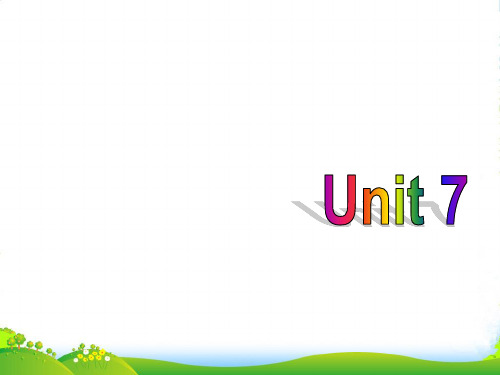
It is not cheap in China. cheap adj. 便宜的
last adj. & adv. last year 最近刚过去(的);最后 (的)
a nice hair clip hair clip 发卡,发夹
The sweater matches the trousers well.
1. Amy want to buy Simon _c____.
a
b
c
2. This year’s football cards cost _b__ each.
a
b
c
3. Amy takes _c_ as Sandy’s present.
a
b
4. The hair clips cost __b__.
Amy bu__y_s five. In the second shop, she finds nice ha_i_r_c_li_p_s. She thinks they m_a_tc_h__ Sandy’s p_in_k_ coat. All the gifts cost Amy ni_n_e_t_ee_n__ yuan.
The presents __c_o_st__ Amy 19 yuan. The presents I want to buy for Simon and Sandy are 23 yuan. I have _en__o_u_g_h money for them.
Retell the passage.
last adj. & adv. 最近刚过去(的); 最后(的)
hair clip n. 发卡,发夹 match v. 与…相配,般配 pink adj. & n. 粉红色(的) pretty adj. 漂亮的,俊俏的 enough adj. adv. pron. 足够,充分 change n. 零头 different from 与……不同
英语·牛津译林版·选修7_Unit1Welcome参考教案

译林牛津版Module7Unit1Welcome参考教案Teaching aims:1.Develop students’ ability in listening and speaking.2.Make students discuss the development of the electric and electronic appliancesand know the importance of high technology.Teaching aids:Multi-media computer, blackboardTeaching procedures:Step 1: Lead-inⅠ. Begin the class with several questions.1.________ plays an important role in exploring the unknown fields and realizing the dreams of our ancestors(祖先).2. High technology has a direct effect on our life.What electrical and electronic appliances(电器) do you have at home?Ⅱ. Show some pictures of electric and electronic appliances and give the name of each item.Ⅲ. Let students discuss:1. How have these electrical and electronic devices improved our lives?Make a group of four and talk about their functions.2. Give a form and discuss and draw some conclusions of the items listed in the form. Step 2 Picture-talking (the development of the development)Ⅰ. Show a timeline and ask students:What can you conclude from the timeline?Ask students to talk about the development of the appliances according to the given pictures. Step 3: Discussion 1. What can our human beings benefit from the development of electric and electronic appliances?2. Can we depend on these appliances completely?1. Read two passages on P106-1072. Preview reading.1/ 1。
book7unit1languagepointsPPT精选文档
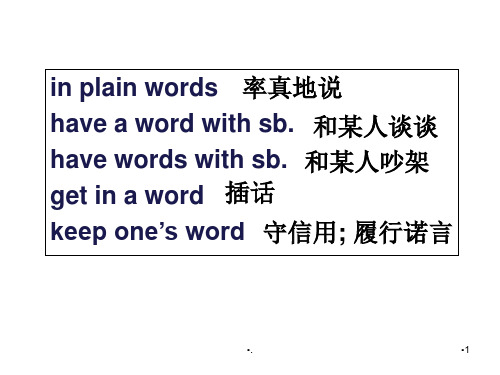
invited to the party.
Air, as well as water, is needed to
make plants grow. 空气和水都是植物生长所必需的。
他是一个好老师,同时也是一个出色
的足球球员。
He is a great teacher as well as a excellent
from time to time
at the same time 同时 all the time 一直 on time 准时 ahead of time 提前 时不时
•.
•7
_A__t _o_n_e_t_im__e_ I had it in mind to study law. 我曾经想学法律。
My father used to read newspapers after breakfast.
be used to do sth. 被用来做某事 be/get used to (doing) sth. 习惯于(做)某事
e.g. The wood is used to make paper.
I’m used to the cold weather.
____________. •.
•19
II. 用下列短语的正确形式填空。
adapt to
adapt from in other words
make fun of after all out of breath
keep one’s word
6) He is quick to __________ new
they need love.
A. the most important B. above all
新交际英语第7册课文重点L11
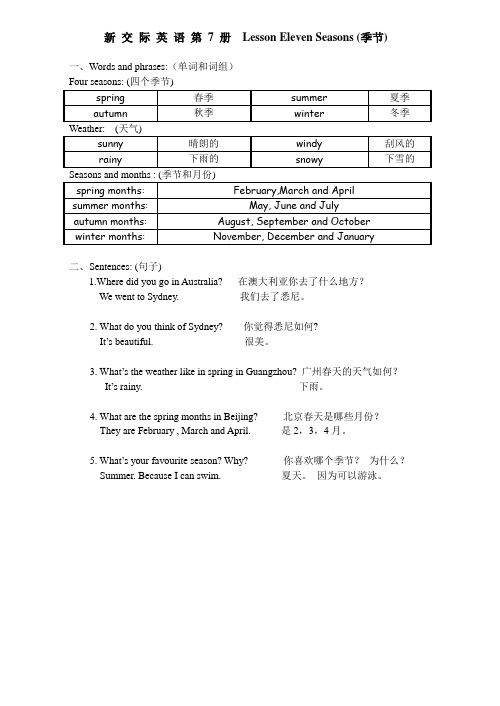
二、Sentences: (句子)
1.Where did you go in Australia?在澳大利亚你去了什么地方?
We went to Sydney.我们去了悉尼。
2. What do you think of Sydney?你觉得悉尼如何?
5. What’s your favourite season? Why?你喜欢哪个季节?为什么?
Summer. Because I can swim.夏天。因为可以游泳。
snowy
下雪的
Seasons and months : (季节和月份)
spring months:
February,March and April
summer months:
May, June and July
autumn months:
August, September and October
winter months:
新交际英语第7册Lesson Eleven Seasons (季节)
一、Words and phrases:(单词和词组)
Four seasons: (四个季节)
spring
春季
summer
夏季
autumn
秋季
winter
冬季
Weather: (天气)
sunny
晴朗的
windy
刮风的
rainy
下雨的
It’s beautiful.很美。
3. What’s the weather like in ring in Guangzhou?广州春天的天气如何?
It’s rainy.下雨。
新课改教案Book 7 Unit1
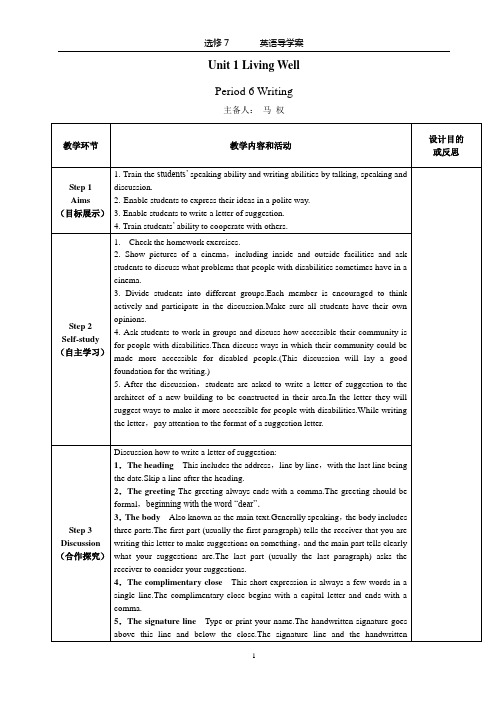
(师导生学)
即学即练
李华是某校高二年级学生,看到本市要修建新车站,现在给总工程师写一封信。
首先,建议在车站内为老人、小孩、残疾人设计特殊的座位,以便让他们及时得到休息。
第二,对于洗手间的设计,要考虑到小孩和残疾人的方便。轮椅能够进入洗手间,自来水开关要放得低一些。
Step2 Self-study
(自主学习)
1.Check the homework exercises.
2.Show pictures of a cinema,including inside and outside facilities and ask students to discuss what problems that people with disabilities sometimes have in a cinema.
3.Divide students into different groups.Each member is encouraged to think actively and participate in the discussion.Make sure all students have their own opinions.
Unit1 Living Well
Period6 Writing
主备人:马权
教学环节教学内容和活动设计源自的或反思Step1
Aims
(目标展示)
1.Train the students’ speaking ability and writing abilities by talking, speaking and discussion.
2.Enable students to express their ideas in a polite way.
(人教版)Book 7 unit1话题热身与词汇学习.ppt
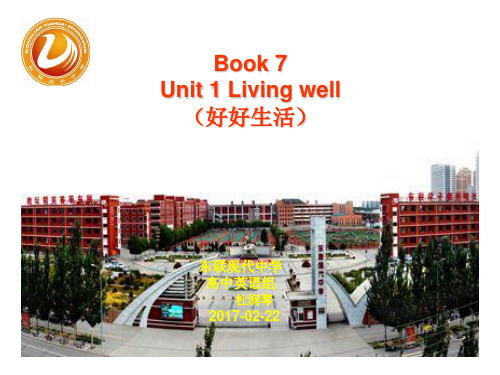
Richard:
• Richard has just passed his university entrance exams. • He had the questions read to him and used dictation to give his answers into a special machine. • He hopes to become a teacher.
Rosalyn:
• loves sports. • She is proud to have taken part in competitions and to have broken a record by runningtwo laps (800 metres) this year. • Her ambition is to become part of the national team for the next Paralympic Games.
Gao Qiang:
• loves acting. Last year he played a major part in the school play. Now his ambition is to become an actor. He takes singing and dancing lessons after school.
• Who are they ? • What success have they achieved?
The worst misfortune is not the ever hurt,but the hopeless future.
• 美国著名的女作家、教育家、 慈善家、社会活动家。在十九 个月时因患急性胃充血、脑充 血而被夺去视力(eyesight)和 听力(hearing)。一生有87年 生活在无光、无声的世界里 • 最著名的著作有: 《假如给我三天光明》《我的人 生故事》《石墙故事》。 • 她致力于为残疾人造福,建立 了许多慈善(charity)机构, 1964年荣获“总统自由勋章”, 次年入选美国《时代周刊》评 选的“二十世纪美国十大英雄 偶像”之一。
新生代英语入门教程(第二版)教学课件unit 7

参考译文
对话1 经理:请照看一下那边的顾客。 员工:好的。 经理:哦,还请记下她提出的任何问题。 员工:没问题。
对话2 管理员:打扰一下,我要拖一下你办公桌下面的地板。 同事:好的,我会让开几分钟。 管理员:谢谢。
对话3 经理:我叫马丁,是你的新主管。 接待员:很高兴见到您,马丁。 经理:我也很高兴见到你。你什么时间上班? 接待员:我每个工作日从早上9:00工作到下午6:00.
3. 我是弗雷德。我上夜班。每周日至周五,我从晚上10:00工作到第 二天早上7:00。我是美国银行的一名大厦管理员。我的主管是玛丽。 我在凌晨1点可以休息一小时。
break n. 休息
e.g. Let’s take a ten-minute break. 我们休息十分钟吧。
WORDS & EXPRESSIONS
参考译文
1. 大家好,我是伊莎贝尔。我是一名接待员,在约翰逊公司上班,我 的主管是马丁。每周一至周五,我从早上9:00工作到下午6:00,下午 1:00休息一个小时吃午饭。
2. 我叫彼得,是佛雷德曼食品公司的一名经理。我的上司是安。每周 三至周日,我从下午2:00工作到晚上10:00,在下午6:00有一个小时的 休息时间。
WORDS & EXPRESSIONS
take care of 照顾
e.g. We need to take care of ourselves in order to take care of others. 我们要照顾好自己,这样才有能力去照顾别人。
WORDS & EXPRESSIONS
• B • Listen and write the employees’ names from Exercise A.
BOOK7 unit1 第2课时
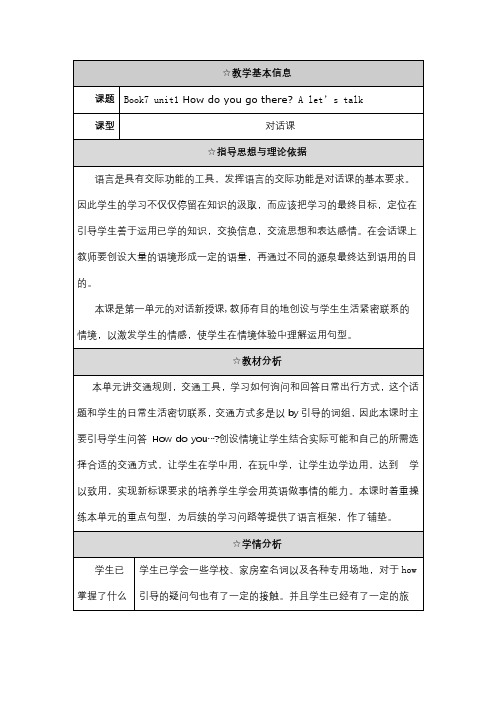
本单元讲交通规则,交通工具,学习如何询问和回答日常出行方式,这个话题和学生的日常生活密切联系,交通方式多是以by引导的词组,因此本课时主要引导学生问答How do you…?创设情境让学生结合实际可能和自己的所需选择合适的交通方式,让学生在学中用,在玩中学,让学生边学边用,达到学以致用,实现新标课要求的培养学生学会用英语做事情的能力。
本课时着重操练本单元的重点句型,为后续的学习问路等提供了语言框架,作了铺垫。
How do you go to school?Usually I go to school on foot.Sometimes I go by bike.朗读句型练习,如齐读,指名读,小组读,拼读,记忆读等。
③跟录音读Let’s talk。
④对话:师生分角色对话,生生分角色对话⑤替换句型中的关键词或对另两幅图进行对话练习。
4 拓展对话:①教师与一学生进行对话引出句子:Because my home is near. Because it’s fast. Because it’s cheap/ expensive.板书,熟读句子。
②四人小组对话练习:要求增添原因的句子,可自由创编新对话内容。
③四人小组对话汇报。
5 完成Let’s try6 Task time:①完成采访表格,要求使用对话:How do you go to school? Why?②将学生分两组,采用游戏“问不倒”游戏进行汇报。
先由一二大组内一学生向三四大组内一学生提问How do you go to school? Why? 问答都顺利的,两边组各得一星。
然后由三四组发问,依次类推。
③统计你所在的组每种上学方式的人数7 Let’s sing教学:听录音两次,跟唱,教师句句教唱。
【设计意图:听说领先,进入对话的学习。
通过小组合作活动,在所创设的情感谢您的阅读,祝您生活愉快。
- 1、下载文档前请自行甄别文档内容的完整性,平台不提供额外的编辑、内容补充、找答案等附加服务。
- 2、"仅部分预览"的文档,不可在线预览部分如存在完整性等问题,可反馈申请退款(可完整预览的文档不适用该条件!)。
- 3、如文档侵犯您的权益,请联系客服反馈,我们会尽快为您处理(人工客服工作时间:9:00-18:30)。
the Dragon Boat Day
have boat races
龙舟赛
the Lantern Festival
watch lantern shows
赏灯
What’s your favourite festival?
你最喜欢的节日是什么?
It’s the Spring Festival , because I can get lucky money.
People usually visit relatives. 一起 get together
Families often get together .
1. What day is today?
The Spring Festival.
2. Where are the children visiting?
1.用②号本抄写重点句子1遍, 并写出中文意思; 2.听录音,跟读课文和单词, 并让家长签名; 3.完成《评价手册》 L1的读写部分。
春节,因为我可以拿利是钱。
A: What’s your favourite festival?
B: It’s the ______,because I can ___________.
New Year’s Day
Women’s Day
May Day
Children’s Day
2008.1.1 2008.3.8
Key sentences
1.Today is the Spring Festival.We usually give lucky money to childen. 2. What do people usually do on the Spring Festival? 3.They visit friends and relatives. Families get together and have a big dinner.
2008.5.1 2008.6.1 2008.9.10
Teachers’ Day
China’s National Day 2008.10.1
P4 Let’s Act
1.看图编出相对应的字母。
E C
China’s National Day
D B
பைடு நூலகம்
F
A
2.根据日期写出相对应的节假日。
New Women’s Year’s Day Day
The No.5 Primary School in Zhu Hai Grade Six Teacher: Miss Zhu
说一说你所知道的节假日
the Spring Festival
have jiaozi (dumplings)
吃饺子
the Mid-autumn Festival have moon cakes
劳动节 妇女节 元旦 儿童节 教师节 春节 元宵 国庆节 端午节 中秋节
China’s National Day the Dragon Boat Day
the Mid-autumn Festival
the Spring Festival
春节
农历1月1日 农历正月15日 农历5月5日
the Lantern Festival 元宵
Teachers’ Day
Children’s Day
May Day
1.抄写L1的单词,各写3个, 中文1个(用①号本); 2.模仿例句,造3组句子 (用①号本): 3.预习课文,听录音。
May Day
Women’s Day New Year’s Day
Children’s Day Teachers’ Day the Spring Festival the Lantern Festival
3. What do people usually give children?
In Mr. Wu’s house.
The lucky money.
4.What do people usually do on the Spring Festival?
They visit friends and relatives. Families get together and have a big dinner.
the Dragon Boat Day 端午节
the Mid-autumn Festival 农历8月15日 中秋节
A Talk
然后说出你听到的其中一句话
探望 visit We are visiting our friends.
Lucky money relative
利是钱 亲戚
We usually get lucky money.
